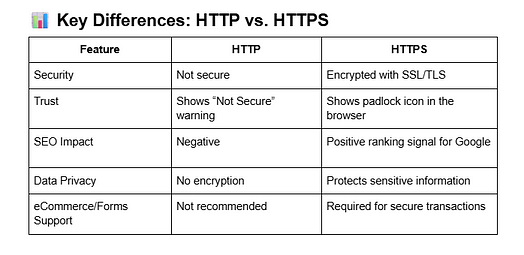What’s the Difference Between HTTP and HTTPS for Websites?
 InfyApp Development
InfyApp Development
Have you ever noticed that some website URLs start with http:// while others begin with https://?
It may look like a small detail — but that extra “s” makes a big difference.
In this blog, we’ll explain what HTTP and HTTPS really mean, why HTTPS is better for your website, and how it impacts your SEO, security, and user trust.
🔐 What Is HTTP?
HTTP stands for HyperText Transfer Protocol. It’s the method your browser uses to connect with websites and load pages.
When you visit a site using HTTP:
Your browser communicates openly with the server
The data you send or receive is not encrypted
Anyone on the same network (like public Wi-Fi) can potentially see your activity
In short, HTTP works — but it’s not secure.
🛡️ What Is HTTPS?
HTTPS stands for HyperText Transfer Protocol Secure.
The “S” at the end means the connection is encrypted using SSL (Secure Sockets Layer) or TLS (Transport Layer Security). This protects your data and keeps it private.
With HTTPS:
All data transferred is encrypted
It protects login forms, payments, and sensitive info
It builds trust with users and browsers
Most modern browsers display a lock icon 🔒 next to HTTPS URLs
👉 At InfyApp Development, we always build websites with HTTPS by default — to ensure your visitors and data are safe.

🔍 Why HTTPS Matters for Your Website
1. 🛡️ It Protects User Data
Whether it’s a contact form or a checkout page, HTTPS keeps user data safe from hackers and third parties.
2. 🔐 It Builds Trust
Visitors feel more confident using a secure site. That padlock icon reassures users that your site is professional and trustworthy.
3. 📈 It Helps Your SEO Rankings
Google has confirmed that HTTPS is a ranking factor. If two websites are otherwise equal, the one using HTTPS is more likely to rank higher.
4. 🚫 It Prevents “Not Secure” Warnings
Modern browsers like Chrome flag non-HTTPS sites with a red “Not Secure” warning — which can scare visitors away before your page even loads.

🙋 Frequently Asked Questions
Q1: Do I need HTTPS if I don’t sell anything on my site?
Yes. Even if you’re not collecting payments, you might still collect emails, messages, or contact info — all of which need to be protected.
Q2: Can switching to HTTPS affect my website traffic?
Initially, switching to HTTPS may require setting up proper redirects (from HTTP to HTTPS). But once done right, it improves your SEO and traffic in the long run.
Q3: How do I know if my site uses HTTPS?
Look at your website URL in the browser:
If it starts with https:// and shows a lock icon, it’s secure.
If it starts with http:// and says “Not Secure,” it needs an upgrade.
Q4: Can InfyApp help me switch to HTTPS?
Absolutely. At InfyApp Development, we help clients migrate from HTTP to HTTPS smoothly — including SSL setup, redirect configuration, and SEO-safe transitions.
✅ Final Thoughts
The difference between HTTP and HTTPS isn’t just technical — it’s about trust, safety, and performance. In 2025, having a secure website is a must, not an option.
If your site still uses HTTP, it’s time for an upgrade.
📞 Need help securing your website?
Contact InfyApp Development we’ll help you set up a safer, faster, and SEO-friendly web experience.
Subscribe to my newsletter
Read articles from InfyApp Development directly inside your inbox. Subscribe to the newsletter, and don't miss out.
Written by

InfyApp Development
InfyApp Development
Infyapp Development Private Limited is a premier provider of mobile app development, digital marketing, and website design & development services in India. Established with a commitment to excellence, we specialize in crafting bespoke solutions that cater to diverse business needs across various industries. Services: Mobile App Development: We excel in creating cutting-edge mobile applications for Android and iOS platforms. Our team leverages the latest technologies to deliver intuitive and robust apps that enhance user engagement and drive business growth. Digital Marketing Services: As a digital-first company, we offer comprehensive digital marketing solutions tailored to amplify online presence and maximize ROI. From SEO and SEM to social media marketing and content strategy, we help businesses achieve their marketing objectives effectively. Website Design & Development: Our expertise extends to designing and developing visually appealing and functional websites. Whether it's a corporate website, e-commerce platform, or custom web application, we ensure seamless user experiences and responsive designs. Mission: At Infyapp Development, our mission is to empower businesses with innovative digital solutions that exceed expectations. We are dedicated to delivering high-quality services that align with industry standards and drive measurable results for our clients. Vision: To be recognized as a trusted partner for businesses seeking transformative digital solutions in India and beyond. We aim to foster long-term relationships built on integrity, professionalism, and excellence. Why Choose Us? Expertise: Our team comprises skilled professionals with extensive industry experience. Customization: Tailored solutions to meet unique business requirements. Result-Driven: Focus on achieving tangible outcomes and ROI for our clients. Customer Support: Dedicated support throughout the project lifecycle and beyond.